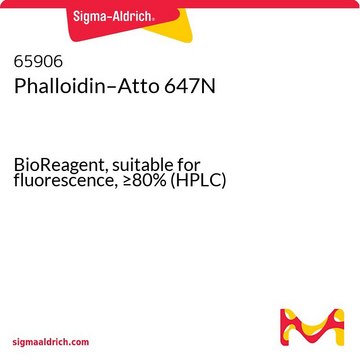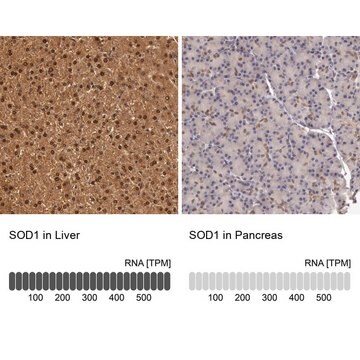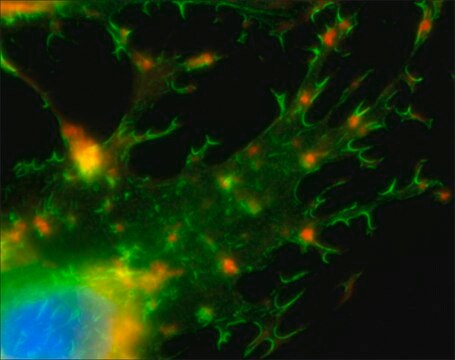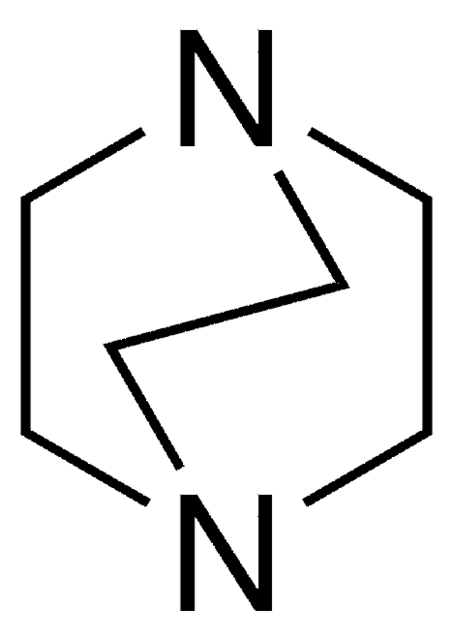Wszystkie zdjęcia(1)
Kluczowe dokumenty
07373
Phalloidin–Atto 740
BioReagent, suitable for fluorescence
Synonim(y):
Atto 740–Phalloidin
Zaloguj sięWyświetlanie cen organizacyjnych i kontraktowych
About This Item
Kod UNSPSC:
12352108
NACRES:
NA.32
Polecane produkty
linia produktu
BioReagent
Poziom jakości
Próba
≥90.0% (HPLC)
Formularz
powder
producent / nazwa handlowa
ATTO-TEC GmbH
przepuszczalność
254 nm
740 nm
fluorescencja
λex 750 nm; λem 764 nm in 0.1 M phosphate pH 7.0
absorpcja UV
λ: 739 -745 nm Amax
przydatność
suitable for fluorescence
temp. przechowywania
−20°C
Opis ogólny
Atto 740 belongs to a new generation of fluorescent labels for the near infrared spectral region. The dye is designed for application in the area of life science, e.g. labeling of DNA, RNA or proteins. Characteristic features of the dye are strong absorption and good fluorescence as well as excellent thermal and photo-stability. Atto 740 is a cationic dye. After coupling to a substrate the dye carries a net electrical charge of +1.
Atto 740 is a pH sensitive product. While practically stable up to pH 7.4 (PBS-buffer), it slowly degrades at higher pH. If exposed to higher pH for coupling purposes, we recommend reducing the pH immediately after completion of the reaction.
Phalloidin is a fungal toxin isolated from the poisonous mushroom Amanita phalloides. Its toxicity is attributed to the ability to bind F actin in liver and muscle cells. As a result of binding phalloidin, actin filaments become strongly stabilized. Phalloidin has been found to bind only to polymeric and oligomeric forms of actin, and not to monomeric actin. The dissociation constant of the actin-phalloidin complex has been determined to be on the order of 3 x 10-8. Phalloidin differs from amanitin in rapidity of action; at high dose levels, death of mice or rats occurs within 1 or 2 hours. Fluorescent conjugates of phalloidin are used to label actin filaments for histological applications. Some structural features of phalloidin are required for the binding to actin. However, the side chain of amino acid 7 (g-d-dihydroxyleucine) is accessible for chemical modifications without appreciable loss of affinity for actin.
find more information here
Atto 740 is a pH sensitive product. While practically stable up to pH 7.4 (PBS-buffer), it slowly degrades at higher pH. If exposed to higher pH for coupling purposes, we recommend reducing the pH immediately after completion of the reaction.
Phalloidin is a fungal toxin isolated from the poisonous mushroom Amanita phalloides. Its toxicity is attributed to the ability to bind F actin in liver and muscle cells. As a result of binding phalloidin, actin filaments become strongly stabilized. Phalloidin has been found to bind only to polymeric and oligomeric forms of actin, and not to monomeric actin. The dissociation constant of the actin-phalloidin complex has been determined to be on the order of 3 x 10-8. Phalloidin differs from amanitin in rapidity of action; at high dose levels, death of mice or rats occurs within 1 or 2 hours. Fluorescent conjugates of phalloidin are used to label actin filaments for histological applications. Some structural features of phalloidin are required for the binding to actin. However, the side chain of amino acid 7 (g-d-dihydroxyleucine) is accessible for chemical modifications without appreciable loss of affinity for actin.
find more information here
Opakowanie
Bottomless glass bottle. Contents are inside inserted fused cone.
Informacje prawne
This product is for Research use only. In case of intended commercialization, please contact the IP-holder (ATTO-TEC GmbH, Germany) for licensing.
Ta strona może zawierać tekst przetłumaczony maszynowo.
Kod klasy składowania
11 - Combustible Solids
Klasa zagrożenia wodnego (WGK)
WGK 3
Temperatura zapłonu (°F)
Not applicable
Temperatura zapłonu (°C)
Not applicable
Wybierz jedną z najnowszych wersji:
Certyfikaty analizy (CoA)
Lot/Batch Number
Nie widzisz odpowiedniej wersji?
Jeśli potrzebujesz konkretnej wersji, możesz wyszukać konkretny certyfikat według numeru partii lub serii.
Masz już ten produkt?
Dokumenty związane z niedawno zakupionymi produktami zostały zamieszczone w Bibliotece dokumentów.
Nasz zespół naukowców ma doświadczenie we wszystkich obszarach badań, w tym w naukach przyrodniczych, materiałoznawstwie, syntezie chemicznej, chromatografii, analityce i wielu innych dziedzinach.
Skontaktuj się z zespołem ds. pomocy technicznej






